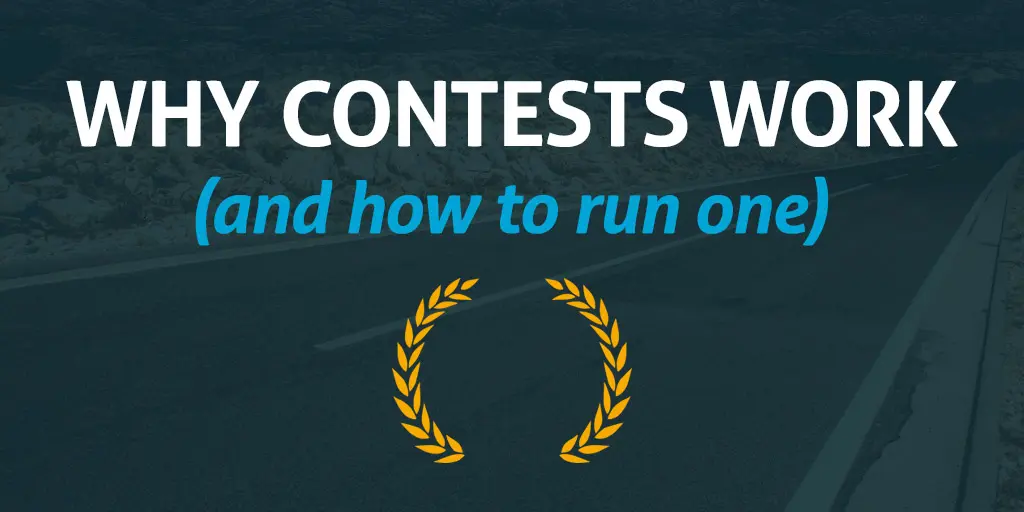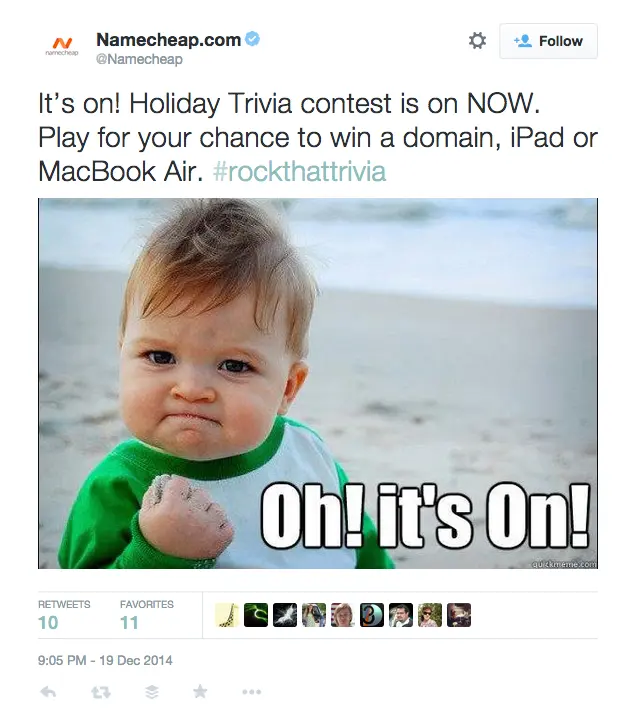
Remember those times when you didn’t want to eat the second half of your peanut butter and jelly sandwich during school lunch, and so you offered it up to your friends at the lunch table? If it was anything like my experience, more than a few eager kids lunged forward and shouted, “I’ll take it!”
For a brief 10 seconds, as you looked over their glistening eyes deciding who would get the prize, you were the most popular kid at the table, maybe even the world. That, my friends, is the power of free. There’s nothing like the word free to grab attention and earn fans, even if they are only interested in free stuff!. As soon as you put it out there that you’re giving away something for free, your popularity sky rockets.
So, to answer your question simply, the most compelling reason contests work is because you’re giving away something of perceived value for free. Hopefully, you’re giving away something more exciting than a half-eaten peanut butter and jelly sandwich, but if that’s what your audience wants, I’m not here to judge.
Would you like a more detailed answer to why contests work? Let’s dissect why they work, and how to make them work for you.
Psst… Be sure to check out this list of 36 successfully-run contests. Grab your copy for free now.
The Psychology of Free
Would you get a tattoo if it was free? Be honest. Even if you’ve never considered getting one before, the word “free” can really give you pause. In a related experiment conducted by psychology professor and bestselling author Dan Ariely, 68% of people in line for the tattoo were only there because it was free and wouldn’t get the tattoo otherwise. Ariely explains it this way:
“FREE! gives us such an emotional charge that we perceive what is being offered as immensely more valuable than it really is.”
-Dan Ariely, Predictably Irrational
Contests work on this same principle. The most successful contests play on your emotions, whether it’s joy, fear, competitiveness, etc. That’s because each contestant can envision themselves using or experiencing that prize. If you can choose a prize that really resonates with your audience and matches up with your brand message, you can increase engagement while building your community.
The Psychology of Urgency
Free isn’t the only thing you have going for you when it comes to running a successful contest. Urgency is also a powerful motivator. It springboards people into action. That’s because no one has the desire to wait three or four months down the road to maybe, hopefully, with fingers crossed win your grand prize.
Your contestants want near instant gratification. One of the best ways to create rabid engagement is with rapidly approaching deadlines. We love contests with a countdown clock.
The Psychology of Scarcity
If you have a ton of branded t-shirts to give away, no one wants them; but if you have only one left, that screen-printed t-shirt suddenly morphs into the Hope diamond.
It’s supply and demand, pure and simple. When there’s less of a supply, there’s more of a demand. That’s why scholarship-type contests work so well. Create a contest where you give away one free spot to an upcoming webinar or your most popular course, and watch the entries flood in.
That’s what happens with Marie Forleo’s annual B-School scholarship contest. At almost $2000, this eight-week training course ain’t cheap, but it’s not just the perceived value of the prize that makes this contest so successful. It’s also the idea that only a few scholarships will be awarded. In Marie’s scholarship contest for 2014, approximately 2000 people entered but only 46 won.
These contestants were motivated by two types of scarcity: lack of funds and one narrow window of enrollment (less than a month). If they didn’t make it before the contest closed, they would have to wait an entire year for the next contest. This contest also flirts with the psychology of urgency as well– very well played, Ms. Forleo.
How to Run a Contest
Now that you know the three types of tactics you need to employ in your next contest, let’s get into the nuts and bolts of how to run a successful one.
When is the best time to run a contest?
May I humbly submit that anytime is a great time? For example, you can create a contest to generate interest in your newest product, service, or event. You can also run continuous contests to maintain high levels of community participation.
No one seems to do this better than domain registrar Namecheap.com. If you check them out on Twitter, you’ll see that Namecheap is constantly running contests and giveaways for their loyal fanbase. Recently, they’ve given away t-shirts in exchange for downloads of their mobile app. They also run a very popular annual Holiday Twitter Trivia contest where winners are announced every hour.


Courtesy Namecheap.com on Twitter
You can run a contest hourly, weekly, monthly, yearly, or a combination of all of the above. It depends on what you’re expecting from the contest. Do you want to grow engagement in your social media profiles like Namecheap.com? Go hourly for a weekend of prizes in exchange for follows and likes. Do you want to increase awareness about a new product or upcoming event? Do a one-off giveaway contest that highlights your newest offering.
There’s no right or wrong answer. Go with what works for you and your audience. And don’t be afraid to mix it up with a variety of contests until you find your sweet spot.
How do you choose the perfect prize?
It’s easy to choose an iPad as your grand prize, but you may want to reconsider. Here’s why: remember how the word free attracts a large crowd, including those who don’t fit with your brand? When your prize is something as brand-agnostic as an iPad, you’ll attract the attention of those who’ll never see your brand again after clicking submit. That’s not what you want.
Whatever the purpose of your contest, you want to make sure that those who entered stick around to continue investing in your brand. Start by attracting the right people– those who are most likely to love your brand for the long haul. How do you do that? With prizes that are highly relevant to your brand. In fact, take a cue from Marie Forleo who is offering up her own course as the prize.
I’m a big proponent of choosing a prize from your own selection of goods or services. Do you sell jewelry on Etsy? Give away jewelry for your contest. Do you run a pet sitting service? Give away a free day of pet sitting. Alternatively, you can give away something highly related, like a certificate for dog grooming at a local pet spa.
Although the prize isn’t directly tied to your brand, it does target the same customer (in this case, a pet owner). On the other hand, if you just gave away a free tablet, you may even get entrants who are allergic to dogs, but not free iPads.
How do you promote the contest?
If you build it, they will come is just a line from a movie. Promotion is so crucial to the success of your contest. You’ve got to get out there and sell it, publicize it, and present it to the masses like a hot-out-of-the-oven glazed donut. Yes, it’s that serious.
Let’s say you’ve already checked out our step by step guide to creating a contest here. Now, it’s time for you to promote the heck out of it. Here’s the three best places to advertise your contest:
Your website. Here’s where you can reach first time visitors and repeat customers. Everyone comes to your website. Make sure that they know you’ve got this killer contest going on. Post it at the top of the page with a header that says, Hey, did you know we’re running a contest? Check it out. Then, be sure to link to your landing page that goes into all the details.
Post it on your sidebar or advertise it on your contest box. Make sure that anyone who visits your site has not escaped without knowing you’ve got a contest going on.
Your newsletter. Not everyone’s going to return to your website, even those loyal to your brand. But, if you’re lucky enough to convert your visitors into a decent mailing list, you can promote your contest right in their inbox. Here’s a pro tip: give those on your mailing list first dibs on your contest. Position it as one of the privileges of joining your mailing list.
Your social media. You’ve got people on Facebook, Twitter, Instagram and the like. Let them know what you’re up to. Be sure to speak the language of each of the social platforms you’re on. Put your contest into visual form on Instagram or Pinterest, shot a quick video about it on YouTube or Snapchat, or make a Q&A of it on Facebook.
Final Thoughts
Contests are an amazing way to market your brand, grow your audience, and bring awareness to things you care about. The trick to running a solid contest is understanding what motivates your audience to action (value, urgency, and demand). Never underestimate the power of free.
Speaking of free, don’t forget to download this list of 36 successfully-run contests. Grab your copy for free now.